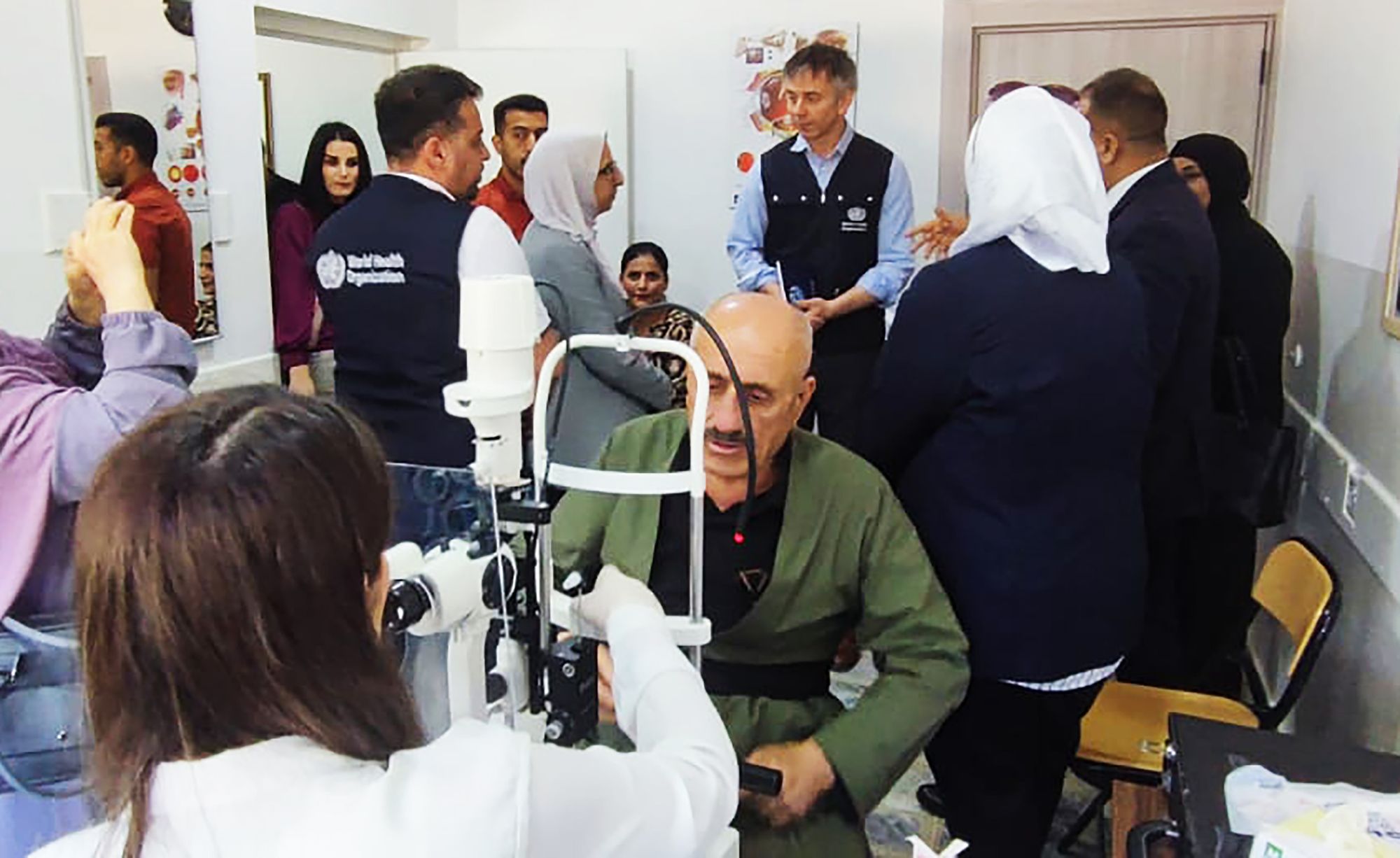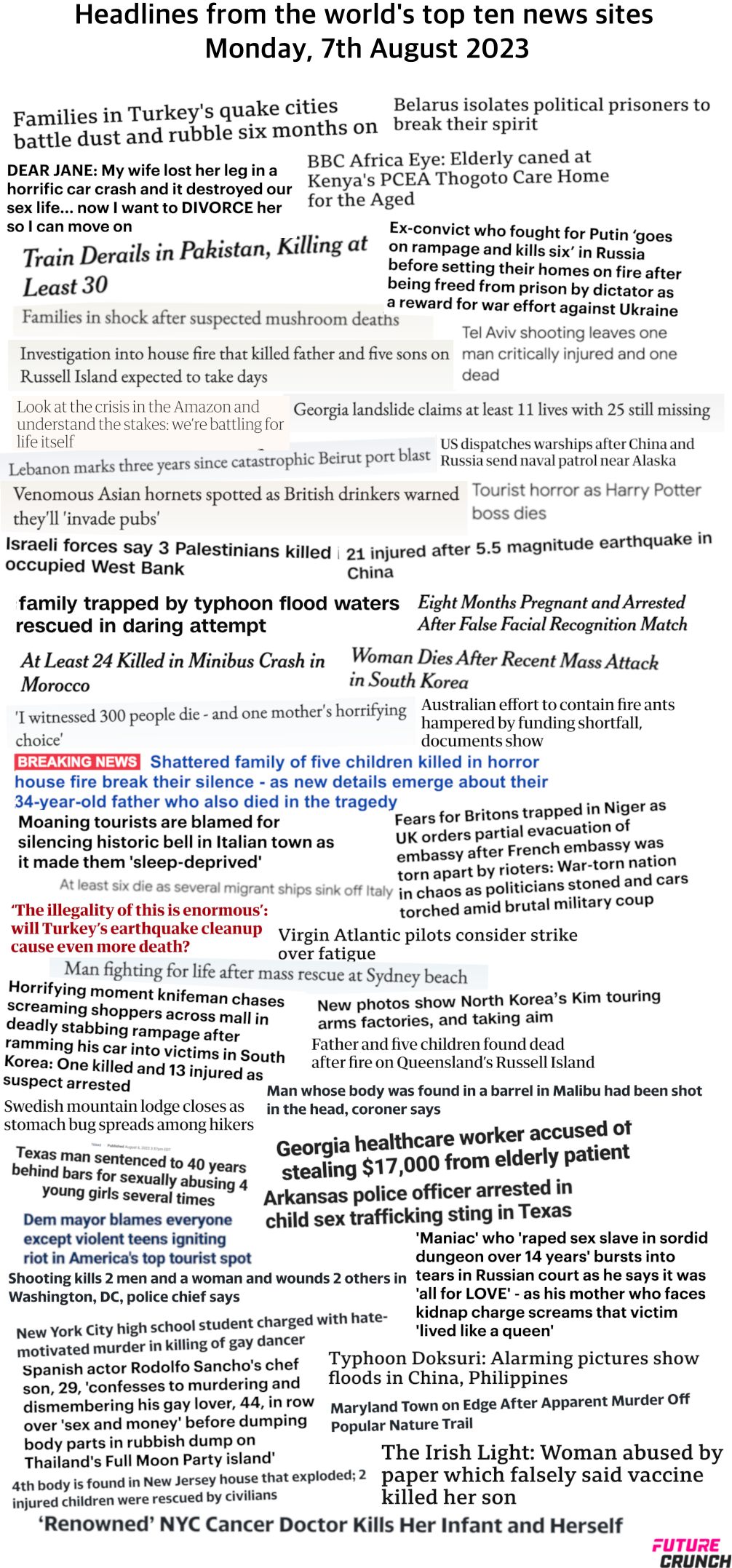Good News on Breastfeeding, Trachoma in Iraq, and Golden Lion Tamarins in Brazil

This is our weekly roundup of good news from around the world. If you'd like to get this in your inbox, you can subscribe for free below.
At the beginning of this week we ran an experiment. On the 7th August 2023, a day we picked randomly in advance, we visited the top ten news sites in the world to see what stories were making headlines. Combined, these websites receive over five billion visits a month, making them humanity's prime information-gathering apparatus - our most important tool for discovering what is happening beyond our immediate environment.
We had a few criteria. We didn't include anything about climate change or the war in Ukraine, because those feel like genuinely newsworthy events. We also didn't include any sport, celebrity or politics news. Once that was all removed, here's what we found:

The reason we all feel like we're doomscrolling is because thanks to the world's top news sites, doom is increasingly the only thing on offer. There isn't even a pretence at balance here. This is a non-stop barrage of death, disaster and division, and it's why we think the biggest problem with journalism today isn't fake news, or filter bubbles, or polarisation, or elitism, or the ongoing obsession with Elon Musk's latest bowel movements.
The biggest problem is bad news.
Good news you didn't hear about
Maharashtra has become the first state in India to roll out universal healthcare, covering $6,900 in expenses for all residents. The government is also spending $362 million on upgrading hospitals and ensuring that every district in the state has a 50-bed critical care unit. In case the scale of this isn't clear—Maharashtra is home to 120 million people, more than the Philippines or Japan. Hindustan Times
Iraq has eliminated trachoma. The number of people in the WHO's Eastern Mediterranean Region requiring treatment for the disease has fallen from 39 million in 2013 to 6.9 million in 2023. Iraq becomes the 50th country to eliminate this neglected tropical disease, marking the halfway point towards the 100-country target set for 2030. WHO
Gavi has begun disbursing nearly $60 million to the Democratic Republic of the Congo to achieve an ambitious goal of reducing the number of children with zero vaccine doses by 35% by 2025. In total, $400 million has been made available to eligible countries to help fund catch-up efforts on childhood vaccinations.
An incredible effort to reach children who missed out on vaccinations is taking place in Brazil. Community health workers are running free clinics in crowded cities, crossing rivers in canoes, taking weeks-long ferry trips, and hiking to some of the most remote areas in the country. Slowly but surely, it's working. UNICEF
A new report says 5.6 billion people—71% of the world’s population—are now protected by at least one best-practice policy to help reduce smoking—five times more than in 2007. Without the measures implemented in the last 15 years, there would be an estimated 300 million more smokers in the world today. WHO
Iran has made amazing progress in eliminating malaria. Sixty years ago, five million malaria cases occurred every year. By 2010, that had dropped to less than 2,000, and by 2018, to zero. Having now gone multiple years without infections, it's expected to be one of the 25 countries that will eliminate malaria by 2025. WHO
The US FDA just approved the first oral medication designed to treat severe depression related to childbirth or pregnancy, a condition that affects an estimated 400,000 new mothers in the United States every year. AP
The prevalence of exclusive breastfeeding has increased from 38% to 48% globally in the last decade, just 2% short of the 2025 target set by the WHO back in 2014. 21 countries have increased their breastfeeding rates by more than 10%, showing that progress is possible when breastfeeding is protected, promoted, and supported. WHO
USAID, the largest official aid agency in the world in terms of dollars, just announced a new policy on LGTBQI+ inclusion. 'USAID is incredibly proud to champion LGBTQI+ inclusive development and the human rights of LGBTQI+ people through our work. We stand for nondiscrimination, for empathy and for inclusion.' Washington Blade
It's been a year since the US government signed the bipartisan PACT Act to take care of its veterans. In that time, nearly 786,000 disability claims have been made, 435,000 have been processed, and 348,000 have been approved. 'This new law can be the largest expansion of VA benefits and care in the history of the VA.' AP
Serial killers inhabit a central place in America's storytelling traditions, but their actual number has dwindled dramatically. In 1987, there were 198 known active serial killers and 404 known victims. By 2018, there were only 12 known serial killers and 44 victims. NYT
France: an anarchic, gilets jaunes society on the brink of collapse, right? Nope. The economy is doing surprisingly well, and poverty is far below its European neighbours. School is free from the age of three, and the French live six years longer than Americans. The jobless rate is at its lowest in 15 years, and the country devotes more to social spending than any other in the OECD. Economist
As of last week, Taiwan has made period products available in all schools and is providing additional subsidies for low-income students to purchase supplies they need independently. Its Ministry of Health estimates that about 95,000 students will benefit from the program. Taiwan News
More than 73,000 people in Nigeria just gained access to improved water supplies following the construction of 19 new solar-powered boreholes, and in Uganda a new climate-resilient irrigation project has been launched that will supply more than 108,000 farmers with water over the next six years.
The United States currently has lower inflation, higher employment, lower interest rates, higher rates of home ownership, and a lower poverty rate than it did in 1984, when Reagan released his Morning in America advert. The stock market is approaching an all-time high, household savings are near peak levels, more travellers are passing through its airports than ever before, retail sales are growing, and wage growth is outpacing inflation. And yet, A CNN poll released last week found that 51% of Americans believe the economy is getting worse, and 71% say things are going poorly in the country.
Hmmm. Any guesses as to why people might be feeling so negative?
Hope Is A Verb
Meet Tarek Loubani, an emergency doctor who has created open-source, 3D-printed medical supplies to solve critical shortages in war zones in Gaza and Ukraine. In the latest episode of our podcast, Hope Is A Verb, Tarek shares his journey as a Palestinian refugee - the powerful moments that have shaped his life and inspired his mission to create high quality, open source medical hardware, and make it accessible to those who need it most. Giving us insight into the crisis zones we see in the news, but rarely get on-the-ground stories from, this episode is compelling, confronting and incredibly inspiring.
The only home we've ever known
Gabon will wipe $450 million off its national debt by increasing protections of its marine ecosystems. It’s the second African country after the Seychelles to benefit from a debt-for-nature scheme and will use it to expand its network of marine reserves that protect numerous threatened marine species, including leatherback and olive ridley turtles and 20 species of dolphins and whales. Afrik21
President Biden has designated a new national monument to preserve almost one million acres of public land around Grand Canyon National Park. It’s a huge victory for Arizona lawmakers, Tribes and advocates who have pushed for years to protect the area from uranium mining. CNN
Today marks an historic step in preserving the majesty of this place, first among American landmarks, sacred to tribal nations, revered by every American. It speaks to the soul of our nations, reminds them of who we are.
We're posting it for the second time because it's such good news. The downward trend of deforestation in Brazil continues, with a decline of 42% since January, and that trend looks set to continue as eight Amazonian nations meet in Belém this week to discuss how to increase protection of Earth’s largest rainforest. Mongabay
Since 2007, Africa’s Green Wall has restored 18 million hectares of degraded land, an area the size of Cambodia. Senegal has led the most successful effort, inspiring an overall shift from merely tree-planting to a holistic, bottom-up approach that engages local communities to improve long-term livelihoods and incomes. Mongabay
Six new landmark restoration projects across England will boost wildlife recovery for 176,000 hectares of land, including the Tees Estuary, South Downs and the Lost Wetlands in Cheshire and Lancashire. The projects are designed to manage flooding, improve carbon stores, and build diverse habitats for wildlife like the endangered wart biter cricket. BBC
Over 28 years, the New York Restoration project, a nonprofit created by Bette Midler, has transformed the Harlem River shoreline from an illegal dumping ground into bountiful wetlands. The project has been driven by community engagement and consistent stewardship by residents of nearby Public Housing buildings that are located in flood zones. Inside Climate News
To get anything done in New York, you have to move at the speed of trust. You can’t just come into a neighbourhood that doesn’t know you and expect that everything is going to come together seamlessly.
Lynn Bodnar Kelly, executive director of New York Restoration Project
Over the past decade, the largest landfill in Latin America has been transformed into a thriving mangrove ecosystem. Between 1968 and 1996, an estimated 80 million tons of garbage were dumped in the landfill in Rio de Janeiro, polluting the nearby bay as well as surrounding rivers. The city shut the landfill down in 2012 to begin restoration. VOA
The European Commission will phase out animal testing across the EU for industrial chemicals, pesticides, biocides, and human and veterinary medicines. An estimated eight million animals suffer in laboratories every year and animal advocates are now pushing for a similar ban on animal testing for cosmetics. PETA
Abu Dhabi is becoming a global hub for mangrove conservation and innovation, using drone technology to scatter seeds, which significantly reduces planting costs. Over the last twenty years, the country has planted 20 million seeds and increased mangrove cover by 6,400 hectares. WEF
An NGO in Brazil has created the first protected area for the elusive Kaempfer’s woodpecker after purchasing land in the Cerrado savanna. The bird was believed to be extinct for over a century until it was ‘rediscovered’ in the mid-2000s. The private reserve is part of an increasingly popular trend of buying land to preserve habitats within the Cerrado biome. Mongabay
Our conservation efforts for the woodpecker and the first reserve have paved the way for all the protected areas we manage today and the biodiversity they support. For us, this bird is the living symbol of our work, and seeing it out in the forest is the ultimate reward.
George Georgiadis, co-founder of the Araguaia Institute
Endangered southern right whales are making a slow but steady comeback along Brazil’s coastline, with an annual increase of 4.8% over the past 15 years. The highest number of sightings was 273 whales in 2018. Since 1987, the hunting of whales, dolphins, and porpoises has been prohibited by law in Brazil. Agencia Brazil
Environmentalists are urging the UK government to 'learn from its own successes' after research showed the number of single-use supermarket plastic bags has plummeted by 98% since retailers started charging for them in 2015. 'The success of the plastic bag charge shows that when the government takes real action it gets results, and the public gets on board.' Guardian
Efforts to save Brazil’s golden lion tamarins started in the 1970s, and today the population has rebounded from 200 monkeys to around 4,800. What makes this progress even more impressive is that in 2019 the population experienced a sharp decline from a yellow fever outbreak. Scientists stepped in and vaccinated more than 370 monkeys using shots adapted from the human formula. AP
That's it for this edition, thanks for reading!
Remember, if you're feeling down about the world, it might be because you're only hearing from the doom machine. Progress is happening out there (even if it doesn't make headlines).
We'll be in your inbox again next week, doing our best to bring the good news to you.
With love,
FC HQ
